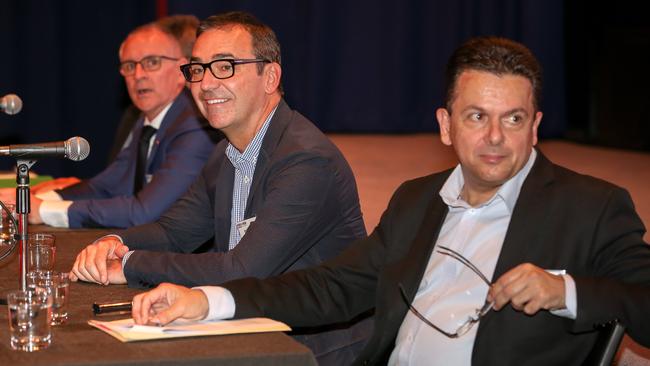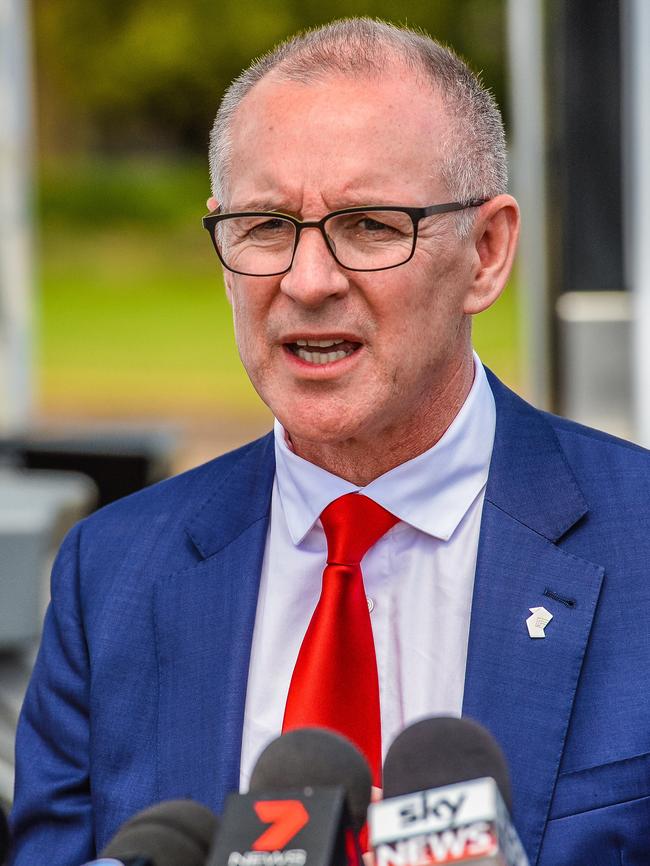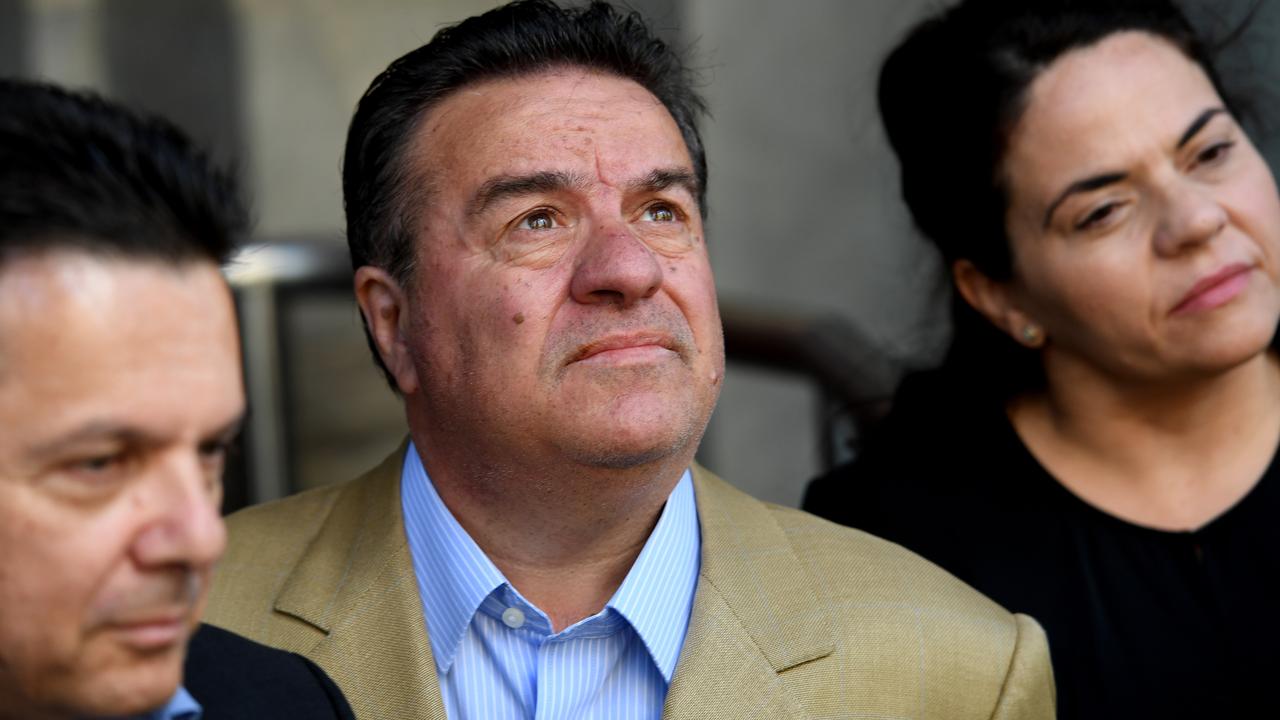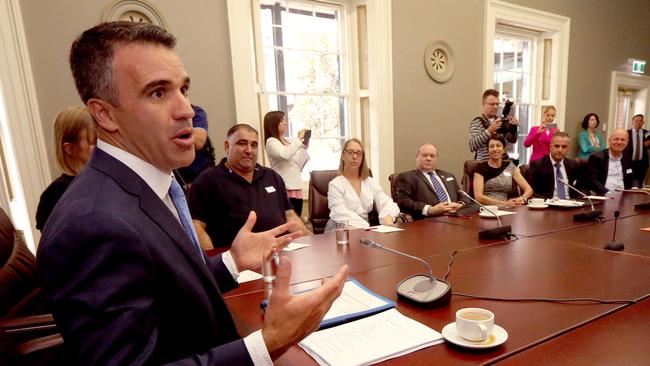David Penberthy: Steven Marshall’s allegations of a Nick Xenophon deal with Jay Weatherill make state election harder to call
AUSTRALIAN history comprises many notable secret deals, and if Steven Marshall is to be believed, South Australia is currently in the grip of one. Whether or not that’s true, the outcome is anyone’s guess, David Penberthy writes.
SA 2018
Don't miss out on the headlines from SA 2018. Followed categories will be added to My News.
AUSTRALIAN history provides us with a couple of notable secret deals over political leadership that became the stuff of scandal and caused enduring headaches at the highest level of government.
There was the Kirribilli Pact between Bob Hawke and Paul Keating: a deal reached between the pair before two witnesses, ACTU leader Bill Kelty and transport magnate Sir Peter Abeles, whereby Hawke would voluntarily relinquish the Labor leadership to Keating.
Hawke subsequently welshed, as did John Howard, it was alleged, on a similar handover pact with his treasurer Peter Costello.
The details of that deal were noted and stored in the wallet of a former defence minister, South Australian Liberal Ian McLachlan, their subsequent release blowing open Costello’s leadership aspirations against the immovable Mr Howard, leaving the Liberals to limp towards defeat in 2007 with the tensions in full public glare.
If Steven Marshall is to be believed, South Australia is currently in the grip of a comparable conspiracy. It goes not to the prize of leadership but the creation of government itself
The process by which a government, or a vague likeness thereof, will be created in SA is anyone’s guess.
We would probably be better off looking to Italian history, even to Guatemalan history, than anything that has happened before in our once-orderly land.
According to Steven Marshall, SA Best leader Nick Xenophon and Premier Jay Weatherill have entered into a nudge-nudge, wink-wink arrangement to form some kind of coalition government after March 17.

Such an arrangement could presumably occur if the Liberals fell short of a majority, but still won the highest number of Lower House seats and the highest proportion of the popular vote.
This is an eminently possible scenario. It is conceivable that the Liberals win 18 seats, Labor 16, and Xenophon 13, or something in that order, where a Labor/SA Best grouping would trump the Libs.
Steven Marshall has no evidence for any of this.
This matters not, he figures, and he is right in a crude tactical sense.
Marshall has to do two things to win a clear majority at this election. He has to convince voters that a vote for Xenophon is a vote for Weatherill.
And he has to almost beg wavering voters to embrace the following defeatist rationalisation – that however crap they think the Liberals are, surely nothing could be as bad as the uninterrupted 20-year rule of the South Australian Labor Party.
In issuing such an over-the-top attack on Xenophon, Marshall is showing some hitherto unseen ticker. He is also underscoring the two points above about the benefits to Labor of the Xenophon campaign.
That argument is made more compelling by the fact that so many of the Labor-held seats SA Best is targeting are actually nominal Liberal seats as a result of the redistribution of electoral boundaries.
The clearest example of this is Mawson, held in 2014 by Labor Tourism Minister Leon Bignell with a 3 per cent margin, but now a 6 per cent nominal Liberal seat at this year’s election with the inclusion of conservative areas such as Kangaroo Island.
Nick Xenophon argues that the Marshall assertion is defamatory.
I am not sure where the defamation arises, especially given that the threshold for establishing defamation is (rightly) higher in the context of party politics. Politicians habitually accuse each of other of being misleading, deceitful, of being liars, plain and simple.
My bush lawyer instincts tell me that Marshall could easily counter that all he was claiming was that Xenophon has been historically closer to the ALP, and that people around the traps in the Xenophon and Labor camps have been having friendly chats during the campaign about what might happen after March 17.
The timing of Xenophon’s threatened legal action is very interesting in terms of the election date.
He flagged his action on Wednesday with what’s called a Concerns Notice to Marshall, giving the Opposition Leader 28 days to respond.
That takes us up to March 14, just three days before the election.


Marshall has got the tactics right on this, but there is an opportunity yet for Jay Weatherill to turn it to his own advantage.
Psychologically, he is the person with the least riding on the election outcome.
If he wins, if Labor really does somehow pull off a fifth straight win, it will be one of the greatest political miracles of all time.
Weatherill is not remotely burdened by the weight of expectation.
This affords him more freedom than his two opponents.
Xenophon looks exhausted already, understandably so, as he tries to cobble together a parliamentary team on the fly, while also producing actual policies, amid valid criticisms of how he is performing on both those fronts.
Marshall at times looks like a man grappling with paranoia that, yet again, the SA Libs can do what they do best and snatch a humiliating defeat from the jaws of what by rights should be the easiest victory.
Weatherill knows that if he loses, no-one will blame him at all.
Most people expected him to lose last time anyway; it seems remarkable that he’s not a sure thing of losing this time, too. He has been in politics long enough not to care, and could easily resume his legal career and enjoy some quiet time with his wife and girls.
The best take for Weatherill on the Marshall-Xenophon stink is to try to rise above it, pretend to be the statesman, to argue that, with these two fellows squabbling like cats and dogs, only Labor can deliver mature and stable government.
Yeah I know, it sounds crazy.
But crazy is the order of the day right now, in an election that might end up being watched in both Italy and Guatemala as an example of just how dysfunctional a Parliament can truly be.
David Penberthy hosts breakfasts on FiveAA with Will Goodings



